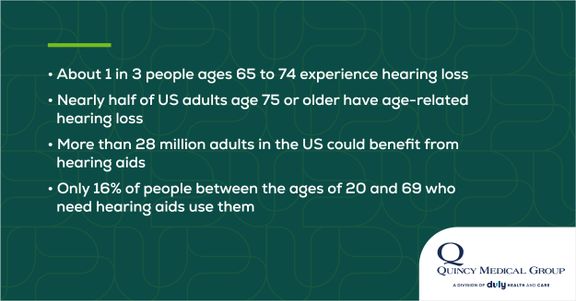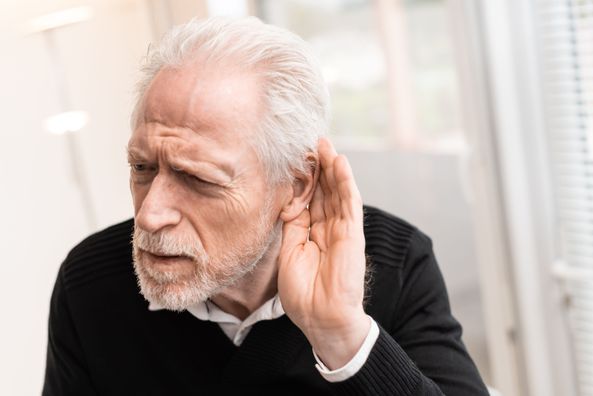Hearing Loss Can Happen as We Age, but Health Conditions Could Also Be to Blame
Hearing loss can sneak up on you over time and can seemingly happen overnight. Either way, losing your hearing can send you on a downward spiral – but the good news is there’s no need to panic. Thanks to advancements in hearing aids (both prescribed and over-the-counter) and hearing augmentation implanted devices such as cochlear implants, there are plenty of solutions available.
While hearing problems can appear at any age, they are particularly common as you get older.

Knowing what’s causing your hearing loss – whether it’s the normal loss that comes with aging or a medical condition that needs attention – helps your provider decide how to treat it.
Common Causes of Hearing Loss
There are plenty of reasons besides aging why you might notice a change in hearing, including:
Overexposure to loud noises, like loud music in earbuds or at concerts, work environments, and shooting firearms
Dementia, which can be linked to untreated hearing loss
A buildup of earwax, an ear infection, or fluid in your ear
Certain medications, like high doses of aspirin or chemotherapy
A severe head injury, which can damage the delicate structures in your ear
How to Spot Hearing Loss Symptoms
The symptoms of hearing loss can be subtle at first. Keep an ear out for signs like:
- Ringing in your ears (tinnitus)
- Trouble following conversations, especially in noisy places
- Needing to crank up the volume on your TV or phone
- A sensation of pressure or fluid in one or both ears
- Frequently asking others to repeat themselves
- Family or friends telling you that you need your hearing evaluated
Getting Screened for Hearing Loss
Hearing loss screening isn’t a routine part of most medical check-ups. Providers often rely on patients to speak up if they’re experiencing symptoms. It can be difficult to start the conversation, even with your provider. Hearing loss can bring up a mix of emotions, like anxiety and depression, and can even make some existing mental health challenges worse. But bringing it up with your provider is key so that they can further evaluate your hearing loss and help you find the right solution.
If you’re concerned about a change in your hearing, schedule an appointment with a Quincy Medical Group audiologist today.
Improving Your Hearing
There’s good news if you’re having trouble hearing: hearing loss isn’t always permanent. And even if it is, modern treatments like hearing aids and even implanted devices such as cochlear implants can help you stay connected to the people and moments that matter most.
Treating hearing loss depends on the cause and severity. In some cases, a simple earwax removal (performed by a provider, not with a Q‑tip), can do the trick. For hearing loss caused by repeated infections causing fluid buildup in your ear, you might benefit from a surgical procedure where your provider implants small tubes to help your ears drain.
But in general, there are two main types of treatments: hearing aids and implanted augmented hearing devices, like cochlear implants. These treatments work very differently. Hearing aids make certain sound ranges louder, resulting in them being easier to detect by damaged ears. They are especially helpful if your hearing loss is able to be aided as determined by an audiologist after testing not only your pitch perception but also your word recognition.
Hearing aids are convenient, small, and easy to use. While they won’t completely restore your hearing, they’re an excellent way to get back into the conversation. With options like invisible-in-the-canal, over-the-ear, or open-fit models, there’s a style for everyone. You can even add features like:
- Rechargeable batteries, so you’re not constantly swapping them out
- Noise reduction, to focus on what you want to hear
- Bluetooth connectivity, for streaming audio directly from your device
- Remote controls, for easier adjustments
If a hearing aid won’t help you very much – like if you have severe hearing loss or deafness – you may benefit from a cochlear implant.. Cochlear implants are small electronic devices that bypass the commonly damaged part of your inner ear. They cause your auditory nerve (the hearing nerve ) to send signals directly to your brain, where your brain recognizes the sound.
Whether you choose a hearing aid or an implanted device like a cochlear implant, it will take time to adjust — sometimes months. It is similar to getting new eyeglasses. You may need a few tweaks to get the perfect fit or manage side effects like headaches or irritation. Keeping follow-up appointments and being honest with your audiologist will help you tremendously match your needs to your technology. But once you settle in, you’ll be back to enjoying conversations and laughing at jokes you might have missed before.
Taking Charge of Your Hearing Health
Prolonged exposure to loud noises, aging, and certain health conditions can all contribute to hearing loss. Even if you haven’t experienced symptoms, taking preventive measures can help keep your hearing sharp.
You can help protect your ears and hearing by:
- Lowering the volume on your devices
- Avoiding long exposure to loud noises
- Wearing earplugs at concerts, at work, and when shooting firearms
- Not using cotton swabs to clean your ears (this can actually push earwax back further and could even rupture your eardrum)
- Use a hat, scarf, or earmuffs to keep your ears warm in cold weather
Hearing loss doesn’t have to hold you back. There are plenty of options to help you hear clearly and stay connected to the world around you. From hearing aids to cochlear implants, modern solutions are designed to fit your lifestyle and bring back the sounds you’ve been missing.
The first step? Speak up about your hearing concerns. Don’t let fear or frustration keep you from getting the help you need. With the right care and support, you can navigate hearing loss confidently and get back to enjoying life’s moments — loud and clear.
Ready to take the first step? Schedule an appointment with our QMG Audiologist today and start your journey to better hearing. Our goal is to partner with you to maximize your complete ear and hearing health.
Health Topics:






